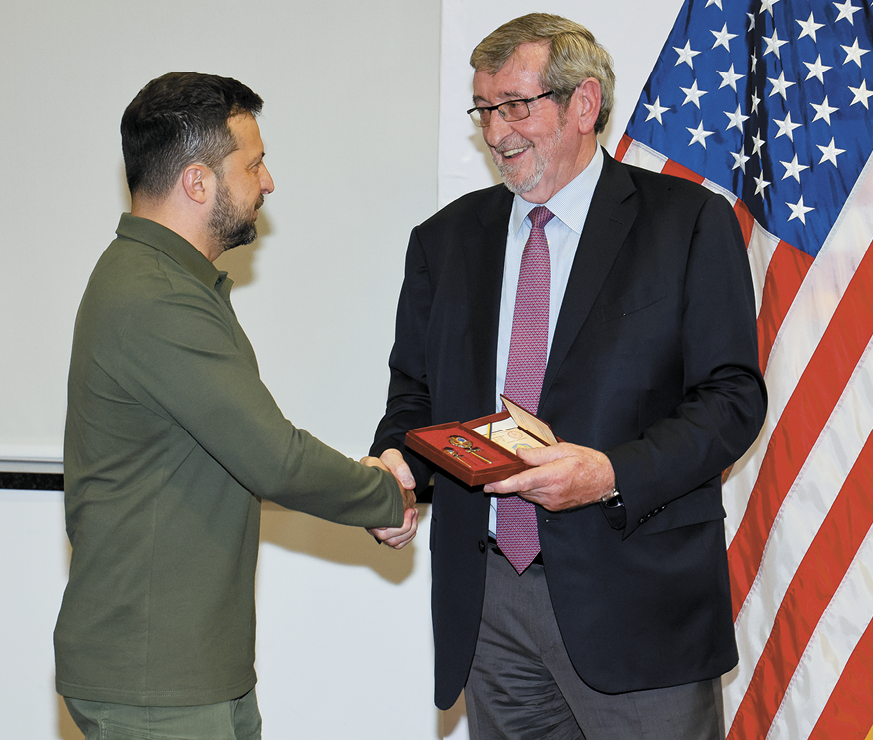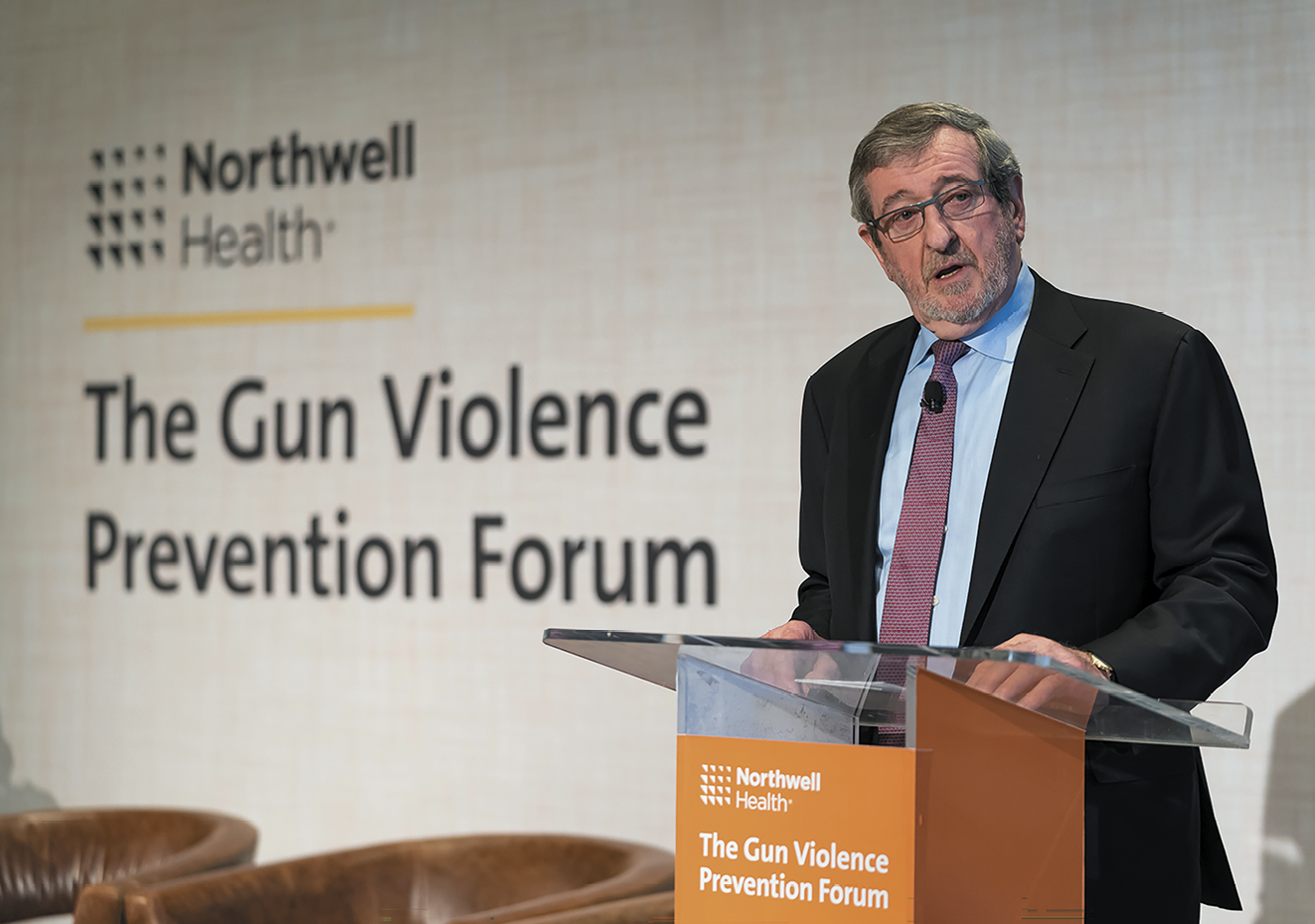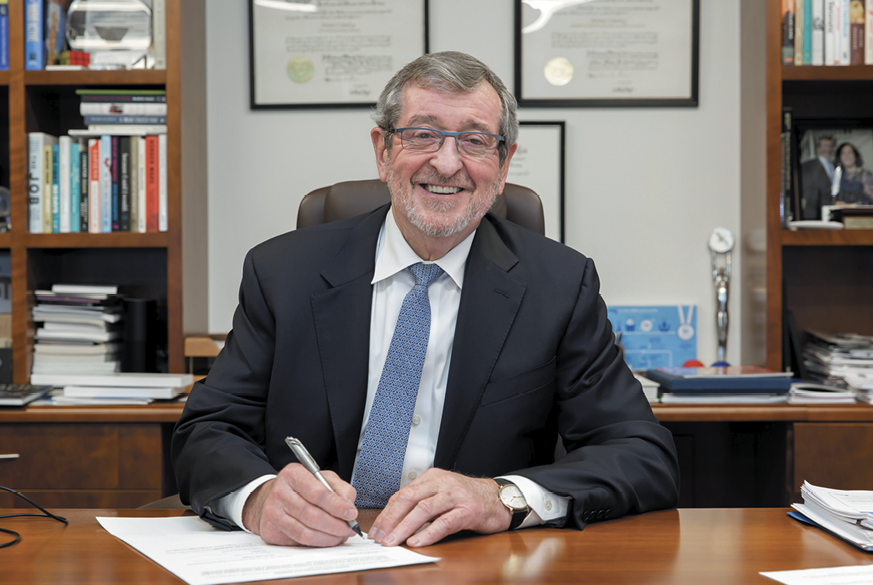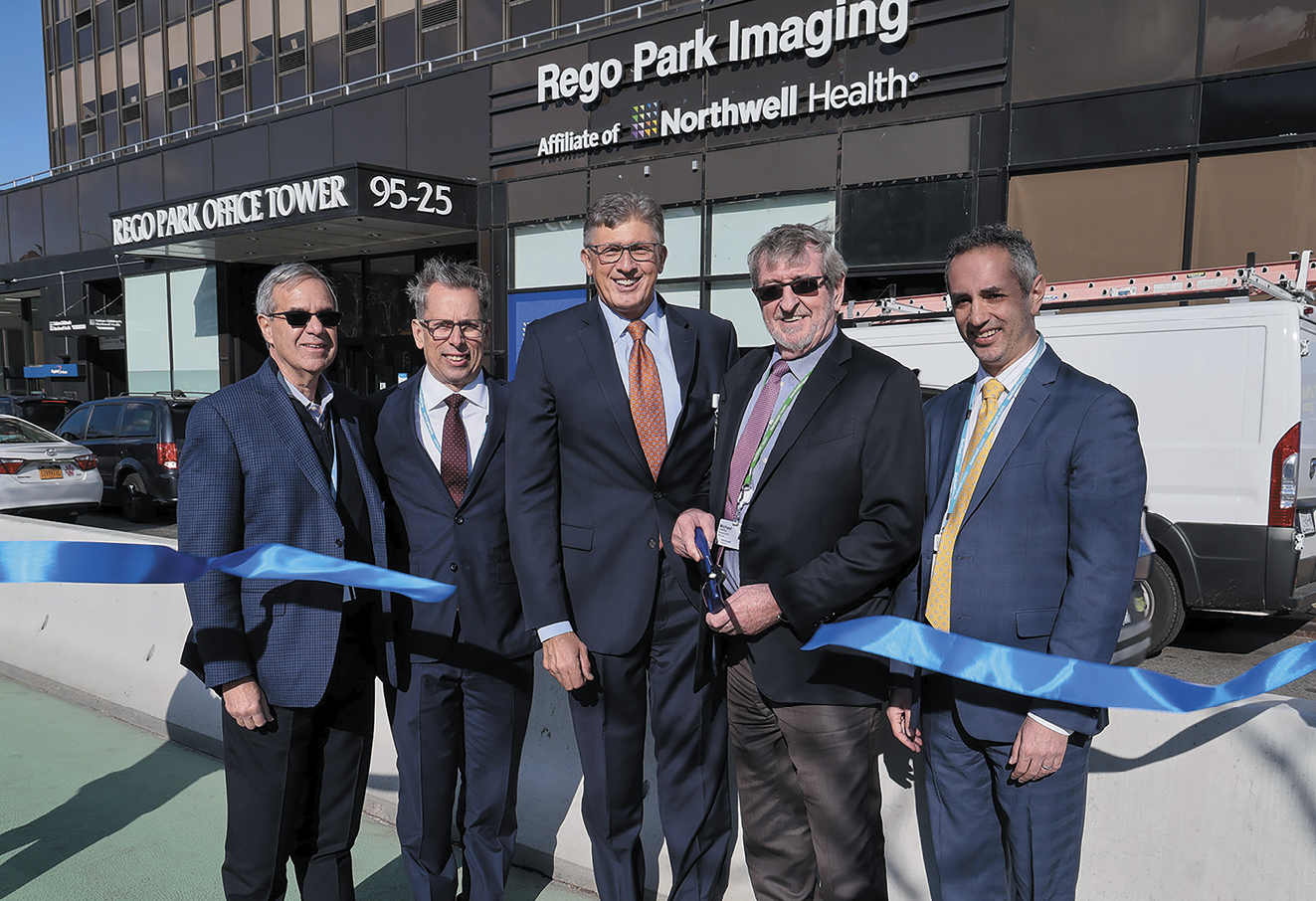- Home
- Media Kit
- MediaJet
- Current Issue
- Past Issues
- Ad Specs-Submission
- Reprints (PDF)
- Photo Specifications (PDF)
- Contact Us
- PRIVACY POLICY
- TERMS OF USE
![]()
ONLINE
![]()
ONLINE

A Noble Calling
Editors’ Note
Michael Dowling is one of healthcare’s most influential voices, taking a stand on societal issues such as gun violence and immigration that many health system CEOs shy away from. His leadership has been invaluable to Northwell’s consistent expansion and prominence. In March 2020, he successfully navigated the health system through the first COVID-19 epicenter in the U.S., detailing Northwell’s experiences in a book titled, Leading Through a Pandemic: The Inside Story of Humanity, Innovation, and Lessons Learned During the COVID-19 Crisis. Overall, Northwell treated over 300,000 COVID patients – more than any other U.S. health system.
Prior to becoming CEO in 2002 and joining Northwell in 1995, Dowling served in New York State government for 12 years, including seven years as State Director of Health, Education, and Human Services and Deputy Secretary to the Governor. He was also Commissioner of the State Department of Social Services. Earlier, he was a Professor of Social Policy and Assistant Dean at the Fordham University Graduate School of Social Services and Director of the Fordham campus in Westchester County. Dowling has been honored with many awards and recognitions over the years, including the Ellis Island Medal of Honor, the Presidential Distinguished Service Award for the Irish Abroad, the Alfred E. Smith Award from the American Society for Public Administration, the National Human Relations Award from the American Jewish Committee, and the Foreign Policy Association Medal Award. In 2017, he was selected to serve as the Grand Marshal of New York’s St. Patrick’s Day Parade. In 2022, he was named the most influential leader in healthcare by Modern Healthcare, ranking #1 in its annual list of the “100 Most Powerful People in Healthcare,” making it the 16th consecutive year he was featured.
Dowling is past Chair of the Healthcare Institute and the current Chair of the Institute for Healthcare Improvement (IHI). He is a member of the Institute of Medicine of the National Academies of Sciences and the North American Board of the Smurfit School of Business at University College, Dublin, Ireland. He also serves as a board member of the Long Island Association. He is past chair and a current board member of the National Center for Healthcare Leadership (NCHL), the Greater New York Hospital Association, the Healthcare Association of New York State, and the League of Voluntary Hospitals of New York. Dowling was an instructor at the Center for Continuing Professional Education at the Harvard School of Public Health. He earned his undergraduate degree from University College Cork (UCC), Ireland, and his master’s degree from Fordham University. He also has honorary doctorates from the prestigious Queen’s University Belfast, University College Dublin, Hofstra University, Dowling College, and Fordham University.
Institution Brief
Northwell Health (northwell.edu) is a clinical, academic and research enterprise with a workforce of more than 86,000 and annual revenue of $18 billion. Northwell is the largest healthcare provider and private employer in New York State, caring for more than two million people annually through a vast network of more than 900 outpatient facilities, including 220 primary care practices, 60 urgent care centers, home care, rehabilitation, and end-of-life programs, and 21 hospitals. Northwell also pursues pioneering research at the Feinstein Institutes for Medical Research and a visionary approach to medical education highlighted by the Zucker School of Medicine, the Hofstra Northwell School of Nursing and Physician Assistant Studies, and one of the nation’s largest medical residency and fellowship programs.

Ukrainian President, Volodymyr Zelenskyy, presented Michael Dowling with the Order of Merit (Ukraine), a special distinction awarded to individuals for outstanding achievements to honor his exceptional leadership in providing vital medical care to Ukraine. Since the start of the war in Ukraine, Northwell has provided lifesaving supplies, telemedicine services, and direct care to wounded soldiers
What are your views on the state of healthcare today?
To begin with, let’s be careful about definitions. There is a difference between medical care and overall health – medical care is a component of health, not its equivalent. If you ask how good our medical care and its delivery is (the healthcare system), I believe it’s the best in the world. Not perfect, of course – the U.S. does not have a unified, standardized national medical care system – we are a constellation of regional and local systems, such as Northwell who provide excellent care. These systems are continuously improving and innovating and responding to the diverse circumstances in each region. It’s also worth reminding ourselves of the enormous progress over the past half century – just think of what can be accomplished today in orthopedics, pediatrics and all other disciplines. The new discoveries in research and models of education have and will continue to propel us forward. If you want to get the best overall medical care, the U.S. is the best place to be. If you ask about the overall health status of the public in general, you have to look beyond the healthcare delivery system – you have to look at the social determinants of health and the causes of illness. Most ill health (75 percent or so) is the result of lifestyle, behavior and zip code – issues of obesity, food and nutrition, housing, poverty, drug and alcohol abuse, etc. Let’s just mention an issue that I am very involved in – gun violence. Guns are the leading cause of death for adolescents and children – this statistic is not caused by the medical care at healthcare systems – it’s a political and social policy issue – the medical care system attends to the horrific results.
We need to define health more broadly. We need to be going upstream to address the causes of illness and focus on prevention. The medical care delivery systems, such as Northwell, have a responsibility here but to have an impact, other organizations, businesses and government need to be consistent partners. Improving overall health goes way beyond just being excellent in the delivery of medical care.

Michael Dowling speaking at a Northwell Health
Gun Violence Prevention Forum
Is there an effective conversation taking place about the need to focus on prevention and wellness?
In some selective areas, yes – overall no, unfortunately. There is an abundance of aspirational rhetoric by well-meaning individuals and business, but not enough consistent follow-through. It’s difficult and requires a long-term commitment, something that is not easy in a world addicted to short-term thinkings. It also requires addressing the issue of individual responsibility – what people do to themselves – if you smoke; if you don’t exercise; if you drink excessively. I am not sure we have the knowledge or science as how to best do this to get the desired results yet.
Allow me to mention two areas of special need that can, over time, make a positive difference. One is the need of a focused commitment on wellness at the elementary and high school level – a curriculum dedicated to the importance of nutrition, exercise, healthy lifestyle, etc.
The other area is the priority need for enhances in funding for mental health – one of the fastest growing areas – especially among adolescents. The growing statistics are very troubling and have long-term disastrous implications. Most of the funding is public (via Medicaid) but most providers, including Northwell lose money.
Will you elaborate on how Northwell is delivering care outside of the hospital?
Many people are surprised when I say that only 47 percent of Northwell’s overall business is hospital, inpatient care. Well over a decade ago, we began expanding our outpatient, ambulatory footprint – moving services that were once done inside a hospital outside, such as imaging, cancer, urgent care, surgery, etc. Northwell was at the forefront of this transformation of bringing necessary care closer to where people live. It’s better service, improved quality and more customer focused. Today, while we have 21 hospitals, we have almost 900 outpatient facilities and locations and the most comprehensive array of post-acute services such as home care, lab services and physical therapy.
This does not mean that hospitals are unimportant or less important. They will continue to provide high-end specialty care, intensive care, trauma services, transplant services and treat serious chronic illness. But they are only one component of the continuum of care. Hospitals will also be the place where most babies are born. At Northwell, we deliver about 1 percent of all babies born in the U.S.

Michael Dowling at work in his office at Northwell Health
Is this structure sustainable?
Organizationally yes, but it will continue to evolve. More care now done only in hospitals will, once the science and quality accelerates, be moved outside. As people live longer and chronic illness increases, high-end tertiary hospitals will expand their capacity. The challenge is financial – the business aspect of care delivery. Most care is paid for by the two large government programs Medicare and Medicaid. At Northwell, it is over 60 percent of our business. Government payors – especially Medicaid -- do not pay enough to cover the cost. This is a universal problem, but exaggerated in high labor cost areas, such as New York. Contrary to what some people think, we cannot, like most businesses, just raise our prices – they are negotiated and regulated. It’s all sustainable as long as there is growth in the non-governmental business and organizations are adaptable enough to launch other revenue-generating options. This is why Northwell has established a for-profit set of business options such as pharmacy, lab, transportation and our own group purchasing organization (GPO).
The traditional way of doing business is not sustainable long term. Those that break with the status quo and become addicted to innovation and new thinking will survive.
Do you feel that the industry is attracting the talent required to meet the future needs in healthcare?
The industry will attract the best if we invest in talent, have a commitment to continuous learning, have a positive, team-oriented culture, and are focused on the mission of serving the whole community. I am convinced that people don’t just want to work for an organization – they want to belong to a cause, to be part of something that has real purpose, that is not afraid to take tough positions on matters important to society at large – e.g., climate change, gun violence, mental health issues, etc.
At Northwell, talent development and management is a top priority. That is why we have an internal “corporate university” called the Center for Learning and Innovation (CLI). It is why we developed an innovative curriculum at our medical and nursing schools and why we work with over 60 high schools (this year touching over 100,000 students). It is why we create internships and apprenticeships for high school and college students to attract them to the field of healthcare and why we have our own scholarship program.
The talent we have today, as good as it is, will not be good enough for tomorrow. We have to create it. It is all a wonderful, exciting opportunity.

Michael Dowling greets new employees at a weekly
orientation
session. Northwell, New York’s largest
private employer,
welcomes between 200-300
new team members every week
How important is it for the Northwell workforce at all levels of the health system to have a service mentality?
Very important. Just think of what they do each day – take care of others who are momentarily (at least for many) less fortunate. This takes a special kind of person – a person with compassion, who has a belief in community, in the interdependence of us all. We are in the customer service business – taking care of people who are in difficulty and improving their health and well-being. It’s a business, in my view, like no other and a business to be proud of. That is why I meet all new employees – about 250 each week – and have been doing so for over 21 years. I remind them that at Northwell they don’t just have a job, they have an obligation and a responsibility. I remind them of the importance of inclusion and diversity – that we all come from different places, all have an immigrant background, and are all here to serve the community and make a positive difference each day.
Will you discuss the impact that the medical school and nursing school have made for Northwell Health?
The schools have been incredibly successful, both in what they do, and in how they do it. The curriculum is innovative and unique. All medical students, for example, are trained as EMTs in the first nine weeks – they ride our ambulances and participate in treating patients from the beginning. They learn by doing, by being out in the community, witnessing the circumstances that patients and families live in. It enhances their knowledge and evolves their perspective on the true meaning of health. We broke with tradition and the status quo in redefining nursing and medical education.
The schools have been an important recruiting tool for Northwell because people want to come to a place that excels in academics and research. The medical school and nursing school have elevated the organization, enhanced our brand, and our ability to recruit the best practitioners and researchers.

Northwell Health leadership (from left): COO Mark Solazzo; John D’Angelo, MD; Rich Barakat, MD; CEO Michael Dowling; and Jesse Chusid, MD, cut the ribbon on Northwell Health at Rego Park, a $52 million, 70,000-square-foot transformative suite of medical practices in the heart of Queens which is easily reachable by car, subway or bus line and anchored by the largest outpatient cancer center in the borough
With the many aspects to the role of leading the largest health system in New York, how do you balance it all?
Life is a balancing act. In an organization such as Northwell, which is a large clinical operation, a large research operation, a large education operation, a large community health operation, a large for-profit operation – you balance it by putting the right people in place and giving them the tools they need to do their jobs. A leader is like an orchestra conductor – an orchestra has multiple components, 50 people playing different instruments at the same time – the conductor doesn’t need to be able to play all the instruments, but he does need to make sure that when the music is played, it sounds beautiful and is seamless and integrated.
How do you describe your management style?
I have been away from home and on my own since I was 16 years old. This makes you learn how to deal with other people, and teaches you the importance of relationships, communication, resilience, and persistence. I played competitive sports, and you can’t win a team sport without being part of the team. I have had the benefit of working in academia and in government which has been very helpful in opening me up to new experiences and different environments.
I get up in the morning knowing that I can make a bigger difference today than yesterday. I always feel I can do better. That opportunity is huge for me. For me personally, working in healthcare is not a job – it’s a privilege and a responsibility that enables us to improve people’s lives and the health of the community at large. It’s a noble calling and an opportunity to inspire.![]()